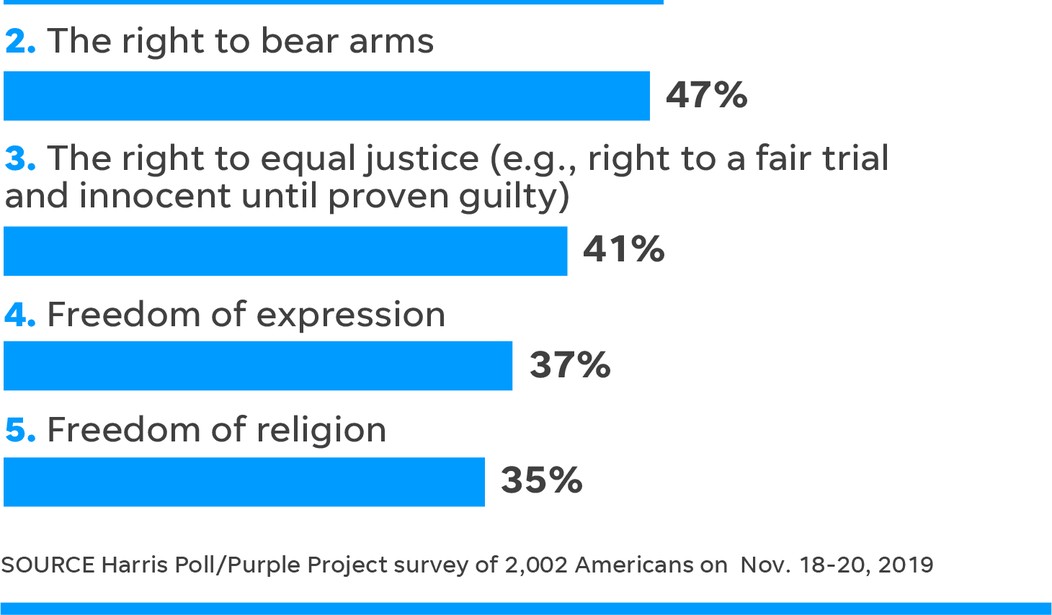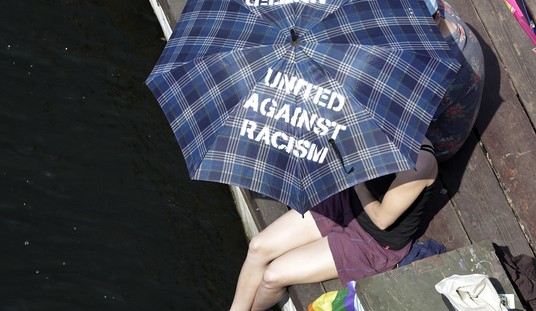An article on December 16 in USA Today reported on a poll that showed a large portion of Americans fear losing their rights to free speech and to bear arms. The article then went to great pains to show that if you word the questions differently, the numbers change. In the process, they expose the pitfalls of relying on opinion polling to understand the wishes and desires of American citizens.
“92% of Americans Fear Losing Their Rights!” the headlines blared. Many conservative outlets picked up the story and ran with it. And with good reason — almost half those polled responded that they fear losing their rights to freedom of expression, access to equal justice under the law, and perhaps most significantly, losing their right to bear arms.
On the surface, those numbers ring true, especially to those of us on the center-right of the political spectrum, when examining what our elected officials are doing to the Constitution. If one digs deeper into the poll itself, however, one can’t escape the spin and backtracking by the folks who commissioned the poll in the first place.
The article begins:
Most Americans surveyed – 92% – think their rights are under siege, according to a poll released Monday.
Americans are most concerned that their freedom of speech (48%), right to bear arms (47%) and right to equal justice (41%) are at risk, says the Harris Poll/Purple Project, which surveyed 2,002 people nationwide.
Then the reporter inexplicably quotes an explanation by the CEO of The Harris Poll with a confusing examination of his own company’s polling methods:
“When you frame something as a threat, it creates a bit of a political response, and it creates division and encampments of special interest,” said John Gerzema, CEO of the Harris Poll. That’s why political parties and lobbying groups warn supporters with strident language, he said: It’s easier to drum up backing for a political cause by talking about an issue in terms of “threats.”
Now, that response in itself contains a bunch of clues as to how Gerzema views his own industry and the organizations that contract with his company. He seems to be confessing to the malleability of polls, and their ability to be used maliciously to direct results toward a predetermined outcome. This, of course, has historically caused backlash on both sides of the aisle, as pundits perennially use poll results as a punching bag when they reveal an answer that they either don’t believe or don’t agree with.
Of course, it’s true that if you ask American voters which rights they would miss, the ones they don’t typically use would be high on the list. The crosstabs for the poll would reveal who they polled and who responded. Specifically, the number of gun owners surveyed would seem instructive in this case. After all, the Second Amendment isn’t exactly unpopular — estimates range from one-third to one-half of all American households contain at least one gun.
Unfortunately, neither USA Today, nor Harris, nor The Purple Project — the co-sponsors of the poll — published a link to the actual poll results. (More on The Purple Project in a moment.)
Gerzema then leads into another thought that really got me interested in digging into who commissioned the poll. By accusing political operatives of using poll results to get voters fired up with inflammatory language (“It’s easier to drum up backing for a political cause by talking about an issue in terms of “‘threats'”), he almost deliberately delegitimizes the fears of many poll respondents who may genuinely believe that their rights may not exist in the future. After all, many states have proposed various levels of bans and confiscations, whether it be plastic bags, guns, or speech deemed politically incorrect.
So, if one were to believe Gerzema, this poll, like many others, also carries some sort of agenda designed to lead the reader to a particular conclusion.
PJ Media reached out to Harris for a more thorough examination of the poll results via their website and Twitter, but received no response.
Ok, what exactly is The Purple Project? A quick search leads to their website, www.wethepurple.org. Purporting to represent the great middle of the road among American voters, they describe themselves on the home page:
Be active. Be informed. Be heard.
The Purple Project for Democracy is a non-partisan coalition, campaign and movement. We span the breadth of American society to rediscover and recommit to our democratic values and institutions.
Did you notice that? The Purple Project for Democracy. Not for the U.S. republic, the Constitution, or anything in the actual American system of governance. Now, one could reasonably assume they simply utilize the shorthand that has become all too common, and don’t actually advocate for direct democracy. Then again, the word democracy appears all over the website, but nothing explaining our republican form of governance, or why the framers of the Constitution chose a representative government over democracy.
The Purple Project has a coalition of supporters and contributors, with some interesting names. Conservative organizations such as the American Enterprise Institute and the Ronald Reagan Presidential Foundation and Institute appear alongside moderate organizations like The Patriotic Movement (dedicated to promoting centrist moderate candidates) and several organizations dedicated to campaign finance reform. Harris Polls is also listed as a coalition member.
An article in Deadline offers more clues about The Purple Project:
The group, The Purple Project for Democracy, even unveiled an online toolkit, which includes ways to “start your Thanksgiving conversations on the same factual footing.”
Example: The climate. “Transportation has surpassed power as the leading producer of greenhouse gas emissions.” Immigration. “Half our yearly population growth is due to immigration.” Active shooters. “In 2018, there were 27 active shooter incidents in the US.”
Its co-founder is Bob Garfield, co-host of public radio’s On the Media, and they’ve created a social media campaign aimed at millennials and Gen Zers. Other organizers include creative media executive Craig Bland and Rebecca Winthrop, senior fellow and co-director of Brookings’ Center for Universal Education. Media partners include NPR, National Lampoon, The History Channel, the News Media Alliance, The Washington Post and The San Francisco Chronicle.
Back to the poll about losing personal liberties. This appears to be rooted in the intention of finding common ground around polarizing issues, but the poll and commentary miss the mark. Equivocating about inherent liberties acknowledged in the Constitution amounts to little more than a rhetorical feint. An interesting idea, to be sure, and perhaps an opening to having civil discussions. But when you talk about compromising on foundational constitutional principles, we can do better than that.
Jeff Reynolds is the author of the book, Behind the Curtain: Inside the Network of Progressive Billionaires and Their Campaign to Undermine Democracy. You can follow Jeff on Twitter @ChargerJeff.











Join the conversation as a VIP Member